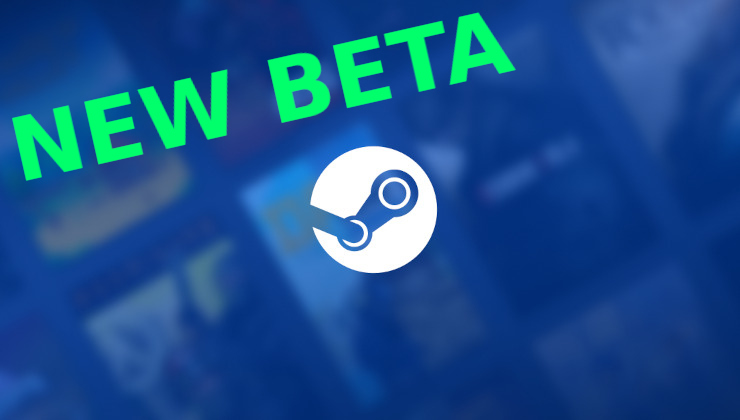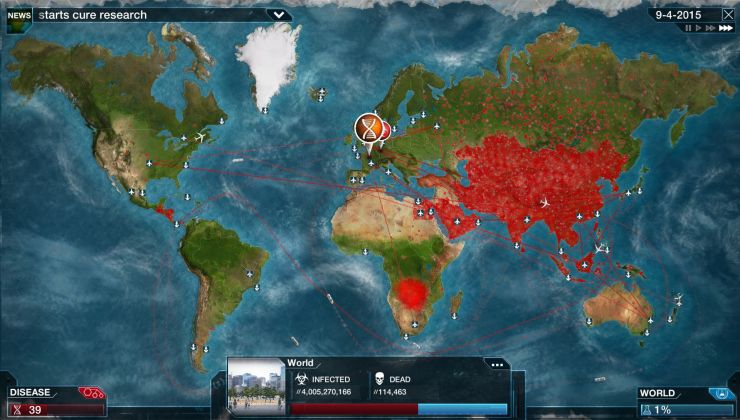Looks like they are rolling out all area's for Linux on Steam now! Valve are improving the store for Linux users.
Seems like the official release isn't far away at all.
It has been said this month will mark the official release, I am inclined to believe it considering the sudden surge of Valve titles and more front page coverage with the Featured Linux Games section.
Some you may have missed, popular articles from the last month:
All posts need to follow our rules. Please hit the Report Flag icon on any post that breaks the rules or contains illegal / harmful content. Readers can also email us for any issues or concerns.
17 comments
Still says "FEATURED PC GAMES" for the Windows listings though... *sigh*.
0 Likes
I agree with Hamish, why can't they just put "Featured Win Games" there. -_- A Linux PC is still a PC
0 Likes
I agree too with Hamish but...
External Media: You need to be logged in to view this.
0 Likes
This is good to see on the front page. It's not as exciting as all of the promoted games (big scrolling banner across the top) being available for Linux, Mac OS and Windows. Equal footing ftw :D
0 Likes
This "PC" labeling of Windows was a genius marketing move by Apple with their "PC vs. Mac" campaign. It basically preemptively kept Linux from the radar of common folk by re-labeling Windows to "PC". Now the Linux community needs to re-train people to understand that a PC doesn't equal Windows. So what we're seeing here on Steam just follows the trail that Apple set.
0 Likes
Quoting: JoeThis "PC" labeling of Windows was a genius marketing move by Apple with their "PC vs. Mac" campaign. It basically preemptively kept Linux from the radar of common folk by re-labeling Windows to "PC". Now the Linux community needs to re-train people to understand that a PC doesn't equal Windows. So what we're seeing here on Steam just follows the trail that Apple set.Actually, it was in place long before that ad campaign (and though Apple definitely embraced the notion of distinction between their platform and other personal computers, I don't believe it originated with them either).
0 Likes
We should count ourselves lucky, while I agree that PC does not mean Windows, PC is associated with Windows. Therefore PC is associated with slow boot times, viruses, blue screen of death etc. Which, as we know, does not occur on Linux. So we should look of the bright side of this situation.
0 Likes
Quoting: JoeThis "PC" labeling of Windows was a genius marketing move by Apple with their "PC vs. Mac" campaign. It basically preemptively kept Linux from the radar of common folk by re-labeling Windows to "PC". Now the Linux community needs to re-train people to understand that a PC doesn't equal Windows. So what we're seeing here on Steam just follows the trail that Apple set.No -- Apple did not invent the term "Personal Computer" -- The Xerox Alto is regarded as being the first "PC", but the term was popularised by IBM (with the IBM PC 5150) in 1981.
The distinction between PC and Mac did not come about until the Macintosh 128K which was marketed as "Mac" in 1985.
It also wasn't a ploy to keep Linux off the radar -- that's just your opinion. When Apple released those adverts, nobody gave a damn about Linux.
0 Likes
Quoting: edgleyNo -- Apple did not invent the term "Personal Computer" -- The Xerox Alto is regarded as being the first "PC", but the term was popularised by IBM (with the IBM PC 5150) in 1981.Please read my comment again and make sure you understand what I wrote before you reply.
Of course we'll never know if Apple had Linux on their radar when they ran the PC vs. Mac campaign. However I wouldn't underestimate the long-term view they most likely had under Steve Jobs and that they did consider Linux a threat in the desktop / laptop market. By running these ads, I would say they were definitely able to push public perception of the market in a direction that penalized desktop Linux adoption without actually naming Linux in the ads at all.
In any case, the future for Linux is still bright. Android is already eating into Apple in the much bigger mobile market and Microsoft is just a fringe player there.
0 Likes
Using the term "PC" to refer to Windows computers is just one of those odd things that happened because IBM called their first microcomputer series "IBM PCs." There were already several home and business computers at the time, so "IBM PC" was used to distinguish the IBM ones from others, like Apple II, TRS-80, Commodore 64, etc.
Eventually the phrase "IBM PC and compatibles" was adopted when Compaq and others began to sell computers compatible with the IBM PC series. This distinguished those from the Apple MacIntosh and the Commodore Amiga. Of course we know that people tend to shorten things. It was probably during this time that it became popular to just say, "PC," "Mac," and "Amiga" to distinguish the various platforms. That distinction stuck all during the time DOS was augmented with Windows, was turned into the Windows 9x series, and was replaced by the Windows NT series. The term "PC" being used to refer to Windows based computers came about mostly because IBM used the generic term "PC" as a name for their line of personal computers back in the day. If you want to blame someone, blame them.
Eventually the phrase "IBM PC and compatibles" was adopted when Compaq and others began to sell computers compatible with the IBM PC series. This distinguished those from the Apple MacIntosh and the Commodore Amiga. Of course we know that people tend to shorten things. It was probably during this time that it became popular to just say, "PC," "Mac," and "Amiga" to distinguish the various platforms. That distinction stuck all during the time DOS was augmented with Windows, was turned into the Windows 9x series, and was replaced by the Windows NT series. The term "PC" being used to refer to Windows based computers came about mostly because IBM used the generic term "PC" as a name for their line of personal computers back in the day. If you want to blame someone, blame them.
0 Likes
Quoting: JoePlease read my comment again and make sure you understand what I wrote before you reply.Your comment was, maybe unintentionally, insinuating Apple devised the term PC to refer to Windows (I assume to try and create a larger margin of difference between the two). Cheese also appears to have picked up on that.
To me it sounded like Linux fanboyism (I'm sure you know what I mean), so I was presenting the facts of where the term came from. As I said, prior to the Mac 128K, people considered Apple a manufacturer of PC's.
If you meant otherwise, please expand, rather than tell me to try again.
Quoting: JoeOf course we'll never know if Apple had Linux on their radar when they ran the PC vs. Mac campaign. However I wouldn't underestimate the long-term view they most likely had under Steve Jobs and that they did consider Linux a threat in the desktop / laptop market. By running these ads, I would say they were definitely able to push public perception of the market in a direction that penalized desktop Linux adoption without actually naming Linux in the ads at all.True, we will never know for sure what their full agenda was -- however, Linux was such a minor competitor and generally speaking regarded as only something for hobbyists, I can't imagine that they would have pre-emptively tried to strike it down *on purpose*.
Quoting: JoeIn any case, the future for Linux is still bright. Android is already eating into Apple in the much bigger mobile market and Microsoft is just a fringe player there.That's also completely true and I don't see the pace at which is gaining popularity slowing down any time soon. The mobile market is definitely all to play for between Apple and Android -- though I'm worried that some developers will just port to Android and skip the Linux desktop (I seem to recall Dead Space was available on Android? -- I don't know I'm still using my N900).
Quoting: CFWhitmanIf you want to blame someone, blame them.To be fair, Microsoft also has partial blame as they pushed to have MS-DOS on all IBM's.
Not that I really care in the end -- I kind of prefer that the general populous see Linux as something completely different to both "Mac" and "PC".
0 Likes
I just read all this (well sort of) and now I sit here wondering how a news item about a steam linux section ended up in thread which covers everything from IBM PC up to Android..... :O
0 Likes
Quoting: BumadarI just read all this (well sort of) and now I sit here wondering how a news item about a steam linux section ended up in thread which covers everything from IBM PC up to Android.....No idea hehe.
Quoting: GuestBriefly, the main featured items list was actually showing titles which all have GNU/Linux versions available. Adds credence to there being a steam linux sale on soon. Which would be cool.Yeah it happened for me too, thought it was odd all featured items being cross platform.
0 Likes
Quoting: edgleyYour comment was, maybe unintentionally, insinuating Apple devised the term PC to refer to Windows (I assume to try and create a larger margin of difference between the two). Cheese also appears to have picked up on that.Of course Apple didn't "invent" the term PC, it would be nonsense to say that and that's not what I meant. I meant that they took that term "PC" and re-purposed it to replace the name "Windows" which people used to use when they were talking about a PC running Windows. For example, at least until the mid 2000s people in Europe would say "Yes, I have Windows" when they meant to say "Yes, I have a PC running Windows". Now you just find everyone saying "Yes, I have a PC" when they actually should again be saying "Yes, I have a PC running Windows".
Now it could certainly be coincidence, but I would say this widespread re-labeling started at the same time that Apple was running their Mac vs. PC ads, so I think it's credible to say that it's Apple's "fault".
And to get back to Steam, dividing games with Apple's scheme into "PC, Mac, Linux" is like segmenting the automobile industry into "Car, VW, Toyota". It just doesn't make sense.
0 Likes
Quoting: JoeOf course Apple didn't "invent" the term PC, it would be nonsense to say that and that's not what I meant. I meant that they took that term "PC" and re-purposed it to replace the name "Windows" which people used to use when they were talking about a PC running Windows.I don't think it was a matter of Apple re-purposing the term's misuse, but instead embracing that other companies were pushing their products as being distinct from Apple's offering. They definitely didn't come up with the notion that an Apple computer is not a "PC".
Quoting: liamdaweYeah it happened for me too, thought it was odd all featured items being cross platform.It's weird. On first load of the store page, I get mostly windows only titles showing up, but then after a reload, it's back to cross-platform only.
0 Likes
Quoting: edgleyTrue, we will never know for sure what their full agenda was -- however, Linux was such a minor competitor and generally speaking regarded as only something for hobbyists, I can't imagine that they would have pre-emptively tried to strike it down *on purpose*.Linux was being viewed as being a potential threat by Microsoft for years beforehand (and it was, especially in the server market where MS lost out) so it is conceivable that Apple could have had a side motivation to side-line Linux, although I definitely agree it was not really what they set out to do with those commercials.
This idea that Linux only recently became interesting or a source for potential for growth that seems to be asserted by your posts is not true at all however. Yes, Linux has grown since then, but we are actually not in that much of a different position than we were back when those advertisements were posted. We are just as interesting now as we were then, so if we did not matter then we do not matter now. It certainly has not changed much over the many years I have been using Linux - we have always been there just off the radar, on the cusp of something great. Realizing that has just been harder than many people would have thought, at least on the desktop space.
0 Likes
Quoting: HamishYes, Linux has grown since then, but we are actually not in that much of a different position than we were back when those advertisements were posted. We are just as interesting now as we were then, so if we did not matter then we do not matter now. It certainly has not changed much over the many years I have been using Linux - we have always been there just off the radar, on the cusp of something great. Realizing that has just been harder than many people would have thought, at least on the desktop space.I think that situation is starting to change now. We are after all discussing this in a post about Steam on Linux. You're right however that there is still a long road ahead.
0 Likes








 How to setup OpenMW for modern Morrowind on Linux / SteamOS and Steam Deck
How to setup OpenMW for modern Morrowind on Linux / SteamOS and Steam Deck How to install Hollow Knight: Silksong mods on Linux, SteamOS and Steam Deck
How to install Hollow Knight: Silksong mods on Linux, SteamOS and Steam Deck